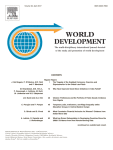Stefano Ponte and Daniel Flentø publishes in World Development.
Least-Developed Countries in a World of Global Value Chains: Are WTO Negotiations Helping?
Nimble trade and industrial policy is essential for Least-Developed Countries (LDCs) to thrive in a world of global value chains (GVCs). “Adaptive states” in LDCs need to create and exploit policy space in national decision-making, build specific production capabilities to participate and meaningfully capture value in GVCs, and handle policy stretches arising from factors and actors they cannot control. In this article, we show that the outcomes of recent multilateral trade negotiations will facilitate these processes only partially. The World Trade Organization’s (WTO) Bali and Nairobi Ministerial Declarations have been commonly portrayed as relative victories for developing countries, but they have not provided sufficient steps forward for LDCs. While the WTO Trade Facilitation Agreement can help integration into GVCs by enabling freer imports and exports, supportive industrial policies are also needed to guide investment in the direction that allows for flexible specialization and domestic value addition—these options are severely limited in the current WTO regime. The legally binding commitments made in Nairobi on rules of origin are also a positive step, but must be linked to the yet unmet duty-free and quota-free commitments. We conclude by arguing that a future agenda for LDCs should focus on supply-side constraints, as well as on allowing nimble industrial and trade policies that can facilitate meaningful participation in some GVCs—and non-participation in others that are more detrimental to broad-based development.
Daniel Flentø and Stefano Ponte (2017) “Least-Developed Countries in a World of Global Value Chains: Are WTO Negotiations Helping?” World Development, DOI 10.1016/j.worlddev.2017.01.020
